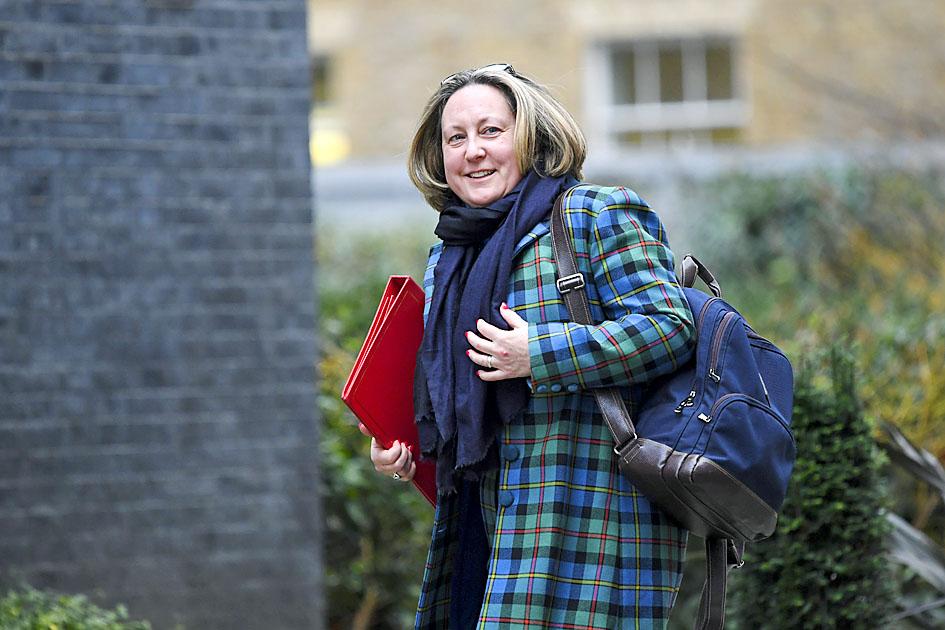Britain will join Taiwan, the US and Australia in backing an EU trade case against China at the WTO over Beijing’s alleged trade curbs on Lithuania, a move that British Secretary of State for International Trade Anne-Marie Trevelyan said would oppose “coercive trading practices.”
The EU last month launched a challenge at the trade body based in Geneva, Switzerland, accusing China of discriminatory trade practices against Lithuania that it says threaten the integrity of the EU’s single market.
“We will request to join the EU’s WTO consultation into these measures as a third party to ensure we combat economic coercion in trade together,” Trevelyan wrote on Twitter.

Photo: Bloomberg
Taiwan, the US and Australia have signaled that they intend to join the consultations.
US Trade Representative spokesman Adam Hodge said that US President Joe Biden’s administration is “deeply concerned” by China’s discriminatory trade practices against Lithuanian goods and EU goods with Lithuanian content.
“We will continue working with Lithuania, the EU, and like-minded allies and partners to push back on the PRC’s [People’s Republic of China] coercive economic and diplomatic behavior,” Hodge said in a Jan. 27 statement. “The United States will request to join these WTO consultations in solidarity with Lithuania and the European Union.”
Vilnius is under pressure from China to reverse a decision last year to allow Taiwan to open a representative office in the capital under its own name.
China has downgraded diplomatic ties with the Baltic nation and pressured multinationals to sever ties with it.
The challenge at the WTO allows 60 days for the parties to confer to reach a settlement. If none is reached, the EU may choose to launch a formal dispute that would set up a WTO panel to study its claims against China.
A Geneva-based trade official said that the participation of other Western countries, assuming they are not blocked by Beijing, would be “helpful” to the EU’s case.
“If you have other members arguing on your behalf and putting forward arguments, I think the panel would look at that,” he said.

DAREDEVIL: Honnold said it had always been a dream of his to climb Taipei 101, while a Netflix producer said the skyscraper was ‘a real icon of this country’ US climber Alex Honnold yesterday took on Taiwan’s tallest building, becoming the first person to scale Taipei 101 without a rope, harness or safety net. Hundreds of spectators gathered at the base of the 101-story skyscraper to watch Honnold, 40, embark on his daredevil feat, which was also broadcast live on Netflix. Dressed in a red T-shirt and yellow custom-made climbing shoes, Honnold swiftly moved up the southeast face of the glass and steel building. At one point, he stepped onto a platform midway up to wave down at fans and onlookers who were taking photos. People watching from inside

MAKING WAVES: China’s maritime militia could become a nontraditional threat in war, clogging up shipping lanes to prevent US or Japanese intervention, a report said About 1,900 Chinese ships flying flags of convenience and fishing vessels that participated in China’s military exercises around Taiwan last month and in January last year have been listed for monitoring, Coast Guard Administration (CGA) Deputy Director-General Hsieh Ching-chin (謝慶欽) said yesterday. Following amendments to the Commercial Port Act (商港法) and the Law of Ships (船舶法) last month, the CGA can designate possible berthing areas or deny ports of call for vessels suspected of loitering around areas where undersea cables can be accessed, Oceans Affairs Council Minister Kuan Bi-ling (管碧玲) said. The list of suspected ships, originally 300, had risen to about

A Vietnamese migrant worker yesterday won NT$12 million (US$379,627) on a Lunar New Year scratch card in Kaohsiung as part of Taiwan Lottery Co’s (台灣彩券) “NT$12 Million Grand Fortune” (1200萬大吉利) game. The man was the first top-prize winner of the new game launched on Jan. 6 to mark the Lunar New Year. Three Vietnamese migrant workers visited a Taiwan Lottery shop on Xinyue Street in Kaohsiung’s Gangshan District (崗山), a store representative said. The player bought multiple tickets and, after winning nothing, held the final lottery ticket in one hand and rubbed the store’s statue of the Maitreya Buddha’s belly with the other,

Japan’s strategic alliance with the US would collapse if Tokyo were to turn away from a conflict in Taiwan, Japanese Prime Minister Sanae Takaichi said yesterday, but distanced herself from previous comments that suggested a possible military response in such an event. Takaichi expressed her latest views on a nationally broadcast TV program late on Monday, where an opposition party leader criticized her for igniting tensions with China with the earlier remarks. Ties between Japan and China have sunk to the worst level in years after Takaichi said in November that a hypothetical Chinese attack on Taiwan could bring about a Japanese